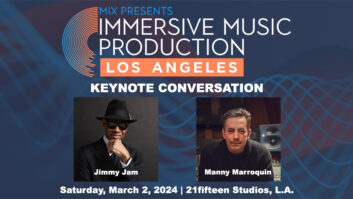Whatever happened to the democratization of music production? Wasn’t that supposed to be here by now? And wasn’t it supposed to be a good thing? Wasn’t every musician going to be able to make records in his or her home, and weren’t all of the giant record companies going to come crashing down in the wake of the home studio revolution and the Internet explosion?
In fact, some of it did happen the way we thought it would, but some of it didn’t. I have a home studio, and I couldn’t live without it. But the record companies are still out there, strong as ever. And you know something? I’m glad they are. We need them. But we need them to do a much better job than they’re doing because the alternative could actually turn out to be worse.
Back in the 1980s, we all knew this would happen. We were going to be able to frolic in the musical playrooms of our dreams, with minimal financial investment and no restrictions on what we could do or how long we wanted to take to do it.
Then in the ’90s, thanks to the World Wide Web, we would be able to funnel our creations directly to a waiting audience, who would enthusiastically embrace the new models for seeking out and buying music, thus eliminating the greedy chain of middlemen consuming every crumb of the economic pie. There was to be a renaissance of creativity, in which millions of artistic flowers would bloom and all of us cultivating those flowers would be justly compensated.
Well, here we are in the mid-Aughts, and it’s awards season. The Grammys, the Oscars and all of the others are going to the same movie studios, the same record companies and even the same old artists. Has downloading, the technology that was going to change everything, actually done so? Well, it made the record labels paranoid beyond belief, but this year’s blockbuster acts aren’t much different from last year’s: The first million-downloaded song was by the not-exactly-underground Gwen Stefani. How about the other new media opening up paths for new talent? For example, Cingular signed an agreement with an artist that lets the company’s cell phone customers hear her next releases (in all the hi-fi glory that medium delivers) before they hit the stores — pretty cool, if you like that sort of thing, and with definite revolutionary potential. Whom did they sign? Gwen Stefani. Meet the new boss, same as the old boss.
The music-making part has worked out pretty much the way it was supposed to. Any kid with a laptop has access to tools that would have cost as much as a house 20 years ago. The studio business has tilted sharply toward the low end. Remote trucks have been replaced by PowerBooks and MOTU Travelers strapped onto the monitor board’s direct outs. High-end studios are being used less to make records and more to score films and videogames. Mid-level commercial studios have all but disappeared as their customers squirrel themselves away in personal and project rooms.
It’s the other part that we’re still waiting for. And we may be waiting a long time. True, there are people who are making some money selling music on the Internet or through genuinely independent distribution channels such as Broadjam and CD Baby. But mass-marketing is still in the hands of, well, the mass-marketers. And they don’t show any signs of letting go.
At the same time, the record industry was supposed to be eaten up by small-fries, and experts were predicting that traditional mass media, like The New York Times and the major TV networks, were going to die and be replaced by personalized sources of entertainment and information that would organically grow out of audience needs and desires, using the Web as the medium.
To some extent, this has happened. There are some terrific new ways to get information. I subscribe to several online news services that give me important political stories that my local paper ignores and business news that’s too specialized even for The Wall Street Journal, to say nothing of USA Today. When it comes to things like books, movies and music, recommendation lists on Amazon, user reviews on the Internet Movie Database and playlists like those on musicstrands.com and the iTunes store are helping people decide what to buy or see or listen to.
But it takes a lot more than a few recommendations on a Website to sway a significant number of people and bring a book, movie or CD into mass consciousness. It’s still up to the old media to do that. They haven’t gone away. I still read The Boston Globe. The Times (which not long ago bought The Globe) is still very powerful, even if readership, especially among young people, is down, and ABC is still responsible for getting the news to millions of Americans (even if they once tried to get David Letterman to replace Ted Koppel). Rolling Stone is doing better than ever, and even Time and Newsweek are gaining influence in the entertainment world.
Much of what we think of as new voices are merely extensions of the old: Comedy Central, for all its attitude and appeal to the younger generation, is owned by the people who own CBS. Spike TV, the Cartoon Network and almost all of your favorite “alternative” cable channels are owned by Viacom, Time Warner or NBC/Universal. Even the Sundance Channel is only partly owned by the Sundance Institute; the rest of it is in the hands of two media giants. Wired magazine, where a lot of these predictions were first uttered, didn’t take long to morph into a techie version of Vanity Fair — not surprising, as both magazines are now part of the same publishing empire, Condé Nast, whose other properties include The New Yorker.
And for the record industry, as we can see on the awards shows and the Billboard charts (whose Dutch parent company also owns Hollywood Reporter and AC Nielsen) and hear on the radio, music that’s really popular (and thus makes real money) comes from only a few sources. And the number of those sources continues to shrink. Who could have predicted even 10 years ago that RCA and Columbia — once bitter arch-rivals in everything from which opera singers sang on their labels to which color television format would be approved by the FCC — would end up being divisions of the same company, to say nothing of being owned by a Japanese conglomerate?
These media behemoths have the marketing, the advertising, the exposure in multiple mediums and the sheer financial muscle to make the biggest splashes in the entertainment world. And, of course, that’s the primary reason why they remain so influential. But the flip side of that is audiences like to be told what to like. We want people and institutions to look up to, to tell us how to behave and what to pay attention to. If a friend tells you something is cool, well, maybe it is. But if Warner Bros. tells you something is cool — especially if it can dress its marketing machine up as some kind of super-hip teenage online community and keep repeating it using the glitziest of music and graphics and costumes and toys and whatever — then it must be.
In the classroom, we want the teacher, not the other students, to tell us what we need to know. We may know some people who make us laugh sometimes, but we always laugh at Jon Stewart and Jay Leno. In concert, we want the artist to speak to us, and we’re not interested in what those around us have to say. (Would you please shut up!?) We watch talking-heads television and listen to talk radio because we want to hear what those people are thinking — that is, once we get past the narcissistic impulse of trying to get our phone call on the air.
These institutions filter what comes our way, and we need them. There’s just too much stuff out there for us to do it ourselves. Too many news stories, too many comedians, too many indie rock bands, too many cartoons for us to deal with, so we look to filters to help us. When we find a filter that we like, we stick with it, whether it’s Utne Reader or Fox News. The magazine you’re reading right now is a filter, and you’re reading it because you approve of what we choose to present to you.
The problem with any filter, however, is how it behaves when it gets, for lack of a better term, clogged. To stretch a metaphor much too far, a clogged filter fills up with hair and other bodily wastes, refuses to let anything pass through untainted and, before long, begins to stink. And the media companies, especially the record companies, are in desperate need of a plunger or a good shot of Drano.
The clogging in the media marketing world is caused by the unimaginable sums of money that are at stake. The cost of marketing a property so that it can attract enough attention to make money has risen to ridiculous levels, and it’s a phenomenon that feeds upon itself. The result is that every marketing effort has to pay off big and fast: Movies have to make back the bulk of their nut during the first weekend and new artists’ first CDs have to ship Platinum. Making a record costs far less than it did 10 or 20 years ago, but the cost of promoting records far outweighs any savings on the production end. The idea of slowly building an artist — of supporting several releases that don’t initially make a big profit so that the artist has a chance to mature and build an audience — is anathema to companies that need to see an immediate return on every investment. When you’ve got that much at stake mucking up the works, very little can get through.
The son of a friend of mine is an executive at one of the major labels, and he recently got a big promotion. The label, according to my friend, has only one really big act, and so his son is desperate to find a new act that will be as big. “He tells me there’s just nobody out there,” my friend says. Now I agree that there is a plethora of lame bands and singers trying to be heard (and not just on American Idol), but I also know that there are plenty of genuinely talented and appealing musicians who would die for the chance to record for that label, and who would be able to attract a good enough following to make decent bucks for everyone. But the label doesn’t want that — they want an act to appear who can, overnight, goose the balance sheet of the whole operation in one fell swoop. That’s not a filter, that’s a brick wall.
So is it time for the big record companies to go? A lot of people think so. Certainly, the labels themselves aren’t doing much to win sympathy, what with suing college students and random Internet users, and placing nasty unremovable Trojan horses on customers’ computers. In other industries, as in the animal kingdom, this is known as “eating your young.”
Now that broadband is within reach of a majority of American homes and businesses, certainly the mechanism for completely bypassing the Big Four is in place. We have other sources of information that can tell us what we want to buy. Computers that record people’s buying and browsing habits are already making decisions about what other items we might want to spend money on. Just as online news services are getting better at customizing news for each reader and eliminating anything that the reader might consider disagreeable, automated recommendation algorithms in online shops can focus our choices so that we only know about things that we are considered likely to purchase — and in the case of creative products, we never learn about new authors, films or recording artists.
As screwed-up and self-defeating as the record companies are, the potential of this kind of extreme “narrowcasting” could be even worse. There’s a well-done and quite frightening Flash presentation from a fictional museum some years in the future at www.EPIC2014.com. EPIC stands for Evolving Personalized Information Construct, a system that uses “his choices, his consumption habits, his interests, his demographics, his social network” to determine what a user should see and buy. Without active participation from respected and authoritative human-based filters, which should include the record companies’ A&R departments, many people will depend more and more on these automatons to make their buying and listening decisions for them.
For some people with open minds and expansive tastes, the machines will make interesting conclusions, propose novel juxtapositions and open up new areas of exploration. But for others, whose purchasing habits are less broad, the machines will shrink their focuses even further. New acts and genres will never have a chance to get their attention. All users will be exposed to will be what the machines, in their cold logic, consider “safe” for them. The market will become even more fragmented as each user becomes his or her own filter. And the ability of music to reach out to people, to open their eyes, to change their minds, to teach them something they don’t already know, to do anything at all except reinforce their own beliefs — and perhaps get them dancing — will be gone.
Paul D. Lehrman is expecting his royalty check to arrive any day now from the four people who downloaded his latest musical effort.







